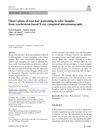 18 citations,
June 1998 in “Circulation”
18 citations,
June 1998 in “Circulation” Mild essential fatty acid deficiency can cause health issues and is worsened by low-fat diets.
 80 citations,
April 2011 in “Plant physiology”
80 citations,
April 2011 in “Plant physiology” White lupin uses specific genes to grow root hairs and access phosphorus when it's scarce.
45 citations,
August 2018 in “Haematologica” Macrophage iron release is crucial for hair growth and wound healing.
 71 citations,
January 2016 in “International Journal of Trichology”
71 citations,
January 2016 in “International Journal of Trichology” Biotin deficiency is not a major cause of hair loss in women, so biotin supplements are not likely to be an effective hair loss treatment.
 15 citations,
January 2010 in “Experimental Dermatology”
15 citations,
January 2010 in “Experimental Dermatology” Hair loss in certain young mice is linked to a specific gene and can be caused by lack of iron.
 July 2024 in “Deleted Journal”
July 2024 in “Deleted Journal” The Ayurvedic program effectively manages hair loss due to iron deficiency anemia.
 75 citations,
May 2013 in “Journal of the American Academy of Dermatology”
75 citations,
May 2013 in “Journal of the American Academy of Dermatology” Zinc deficiency in children can cause skin issues and can be serious if not diagnosed and treated properly.
 1 citations,
August 2022 in “International journal of biological and chemical sciences”
1 citations,
August 2022 in “International journal of biological and chemical sciences” Iodine-deficient diets and antithyroid substances affected rat growth and behavior, but most adapted with positive weight gain.
 9 citations,
January 1981 in “Australian journal of biological sciences”
9 citations,
January 1981 in “Australian journal of biological sciences” Lambs fed a liquid diet showed abnormal wool and skin, which improved with more B-vitamins, suggesting a link to B-vitamin deficiency.
 June 2015 in “Journal of the turkish academy of dermatology”
June 2015 in “Journal of the turkish academy of dermatology” Eating the right foods is important for skin health and can help treat some skin conditions.
 20 citations,
September 1978 in “International Journal of Dermatology”
20 citations,
September 1978 in “International Journal of Dermatology” Hair growth is influenced by factors like genetics and nutrition, and more research is needed to understand hair loss and growth mechanisms.
 January 2020 in “Journal of Clinical Biochemistry and Nutrition”
January 2020 in “Journal of Clinical Biochemistry and Nutrition” Low zinc levels in chronic liver disease patients are linked to more severe symptoms like taste issues and skin problems, and zinc supplements might help.
 May 2024 in “Plant and Soil”
May 2024 in “Plant and Soil” Root hairs in maize grow mainly in air-filled pores, limiting their role in nutrient uptake and plant anchorage.
 October 2023 in “Journal of Family Medicine and Primary Care”
October 2023 in “Journal of Family Medicine and Primary Care” More awareness and education on iron deficiency anemia are needed in Riyadh.
 November 2023 in “Cureus”
November 2023 in “Cureus” Most people in Jazan know about vitamin D, zinc, and ferritin's link to hair loss but don't practice enough preventive measures.
 September 2023 in “Clinical, Cosmetic and Investigational Dermatology”
September 2023 in “Clinical, Cosmetic and Investigational Dermatology” Higher SHBG levels are linked to less severe hair loss in women, but vitamin D levels don't seem to affect hair loss.

Older people tend to have higher biotin levels, which are weakly linked to certain blood components and negatively linked to triglycerides; biotin should be checked in patients with high triglycerides or medication-related skin issues, and only supplemented if deficient. Vitamin D and folate deficiencies are linked to specific skin conditions.
 239 citations,
July 2002 in “Clinical and Experimental Dermatology”
239 citations,
July 2002 in “Clinical and Experimental Dermatology” Low iron and L-lysine levels can cause hair loss in women, and increasing these nutrients can reduce hair shedding.
 March 2023 in “International Journal of Biomedicine”
March 2023 in “International Journal of Biomedicine” Hair loss from Telogen Effluvium can be managed by treating the underlying cause and may improve with treatments like minoxidil.
 207 citations,
April 2006 in “Journal of The American Academy of Dermatology”
207 citations,
April 2006 in “Journal of The American Academy of Dermatology” Iron deficiency may be related to hair loss, but there's not enough evidence to recommend iron screening or supplements for all hair loss patients.
 48 citations,
October 2011 in “Sports Medicine”
48 citations,
October 2011 in “Sports Medicine” Ice-skating athletes often have skin problems due to cold, infections, and inflammation, needing careful treatment and prevention.
 4 citations,
April 2020 in “Journal of Cosmetic Dermatology”
4 citations,
April 2020 in “Journal of Cosmetic Dermatology” Low vitamin D levels are linked to different types of hair loss.

Premature graying of hair is linked to vitamin D and B12 deficiencies, thyroid issues, iron imbalance, stress, and lifestyle habits, and affects quality of life.
 January 2022 in “IntechOpen eBooks”
January 2022 in “IntechOpen eBooks” Some lesser-known causes of PCOS include autoimmune issues, genetic mutations, and changes in the body's microbiome.
 1 citations,
February 2018 in “InTech eBooks”
1 citations,
February 2018 in “InTech eBooks” PCOS in lean women is a serious health condition with implications beyond fertility, affecting metabolism and increasing cardiovascular disease risk.
 January 2020 in “Journal of quality in health care & economics”
January 2020 in “Journal of quality in health care & economics” Most women with depression in the study had low vitamin D levels.
 3 citations,
November 2020 in “Curēus”
3 citations,
November 2020 in “Curēus” A child's hair loss from alopecia areata was fully reversed in five months using diet and supplements.
 4 citations,
March 2023 in “Journal of medical case reports”
4 citations,
March 2023 in “Journal of medical case reports” Taking too much vitamin E caused a young man's blood clotting problems, which improved after he stopped the vitamin E and got treatment.

Low vitamin D3 is not linked to different levels of thyroid hormones in people with autoimmune thyroid disease.
 2 citations,
May 2022 in “Cosmetics”
2 citations,
May 2022 in “Cosmetics” Further research is needed to understand how the microbiome affects hair loss in Alopecia Areata.





























